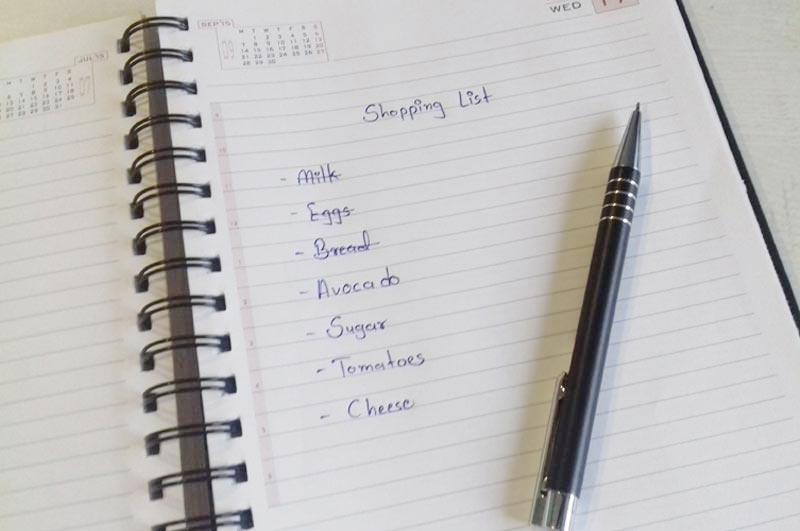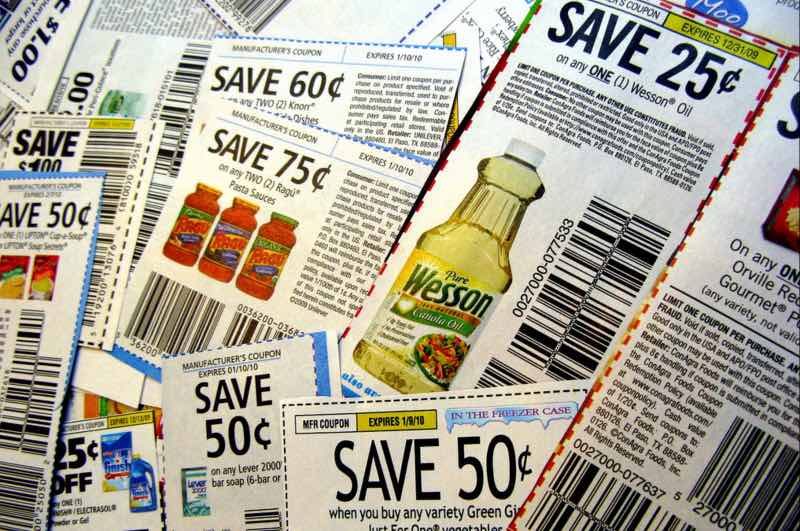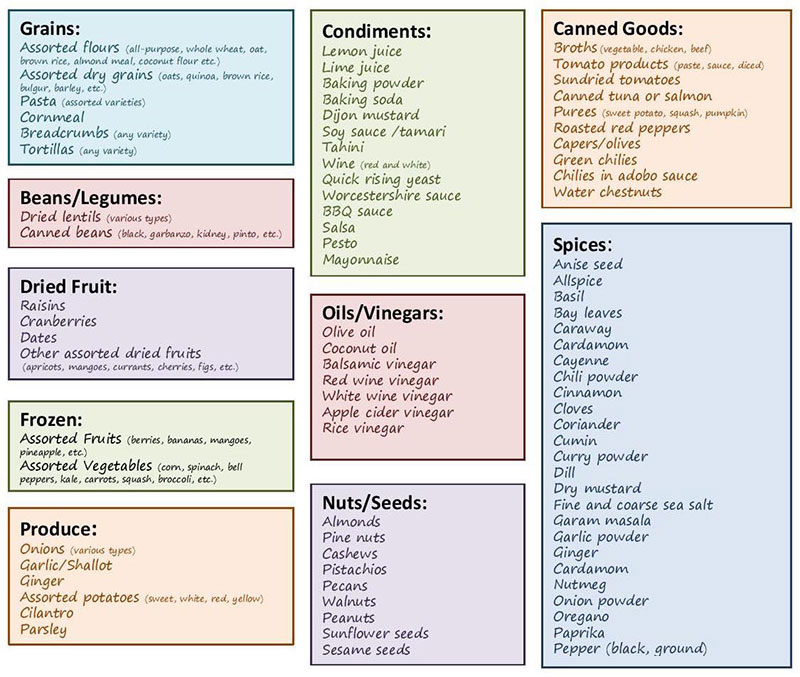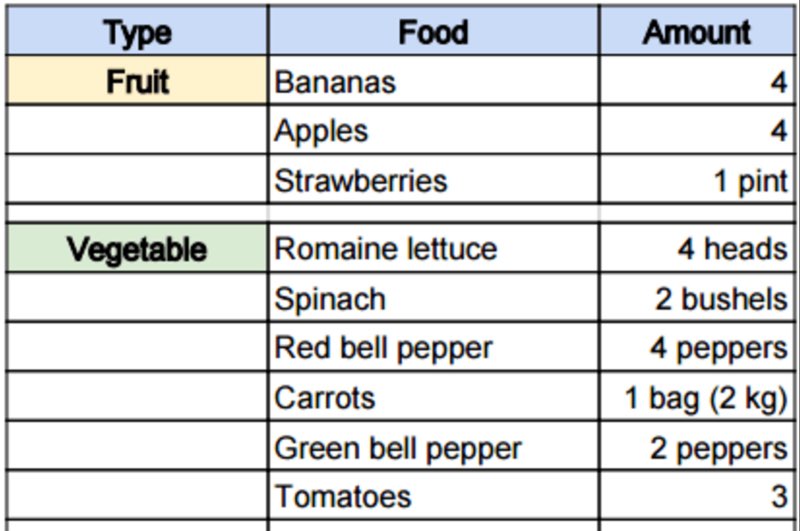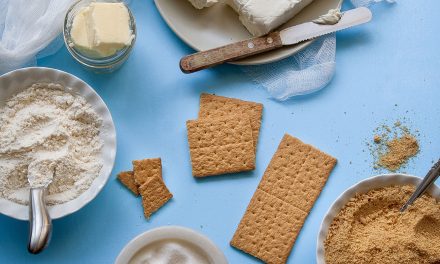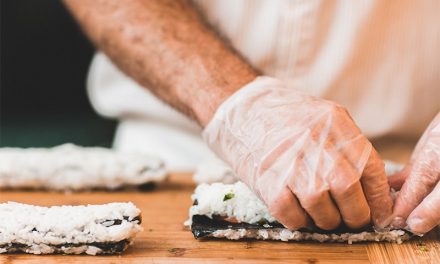Below we share some basic tips on how to make a grocery shopping list on a budget which not only help you stay healthy, but make your pocket happy too! 😉
1. Keep A Running “To-Buy” List
Throughout your day-to-day living, you should have a “to-buy” list tacked someplace central in your home. If you notice you’re out of, or running low on something you’ll need, make a note of it on the list. Done in this way, you won’t have to stress out about remembering all the things you need to buy. Giving yourself the maximum amount of time to plan will give you the highest chance of remembering everything you need. A fridge or bulletin board is a great place to keep it.
2. Figure Out Everything You Need Beforehand
Improvising your list once you’re out shopping will result in hasty buys and unhealthy choices. You should have a well-thought out list before you head out the door. Check the pantry and check what’s running low. While keeping a running tally of grocery purchases will help you figure out the less obvious things, you can cover a lot of your bases by taking a quick stock of your inventory. Recipes often require several ingredients. It’s a good idea to review your planned recipes thoroughly before heading off to the supermarket.
3. Consider The Frequency Of Your Shopping Trips
Before you sit down to compile your list, you should take a second to think about how often you go to the supermarket. The frequency of shopping trips may depend on your location, as well as your mode of transport. For some people, going to the supermarket can mean a big time investment. If your trips are infrequent, it’s all the more important to come prepared with a list. On the other hand, if you’re going multiple times a week, it won’t usually be an issue if you forget an item or two. Unless you live right next door to a supermarket, you should nonetheless see how much mileage you can get out of each trip. Try to minimize one-item trips, as they’re big time wasters. It’s better to get everything you need at once.
4. Predict When You’ll Run Of Certain Supplies
If you already have grocery trips as part of your regular routine, you probably schedule your trips based on how often certain items run out of supply at home. Having some idea beforehand of when a certain item will be used up can help you plan your trips more wisely. If you’re smart, you’ll never run out any supply because you’ll be able to gauge when a trip is needed before it runs out. It would be a waste of effort to gauge the restock time of every item in your home. Instead, just focus on a few of the biggest things that run out often. Toilet paper and coffee beans are just two of the items you might gauge.
5. Look Up Coupons And Specials
Before going in for shopping, you might organize some of your shopping items based on what items are discounted on that given week. If there is something you wouldn’t normally buy that’s currently being sold for a steal, it’s sometimes a good idea to switch up your buying habits accordingly. On the other hand, if there’s a discount for an item you usually buy, you can take the chance to stock up on more of it than you normally would.
6. Look At Pre-Made Grocery Lists For Ideas
Most people will prefer to buy groceries according to their own preferences. Nonetheless, giving a default grocery list a looking over can be useful when brainstorming for things you might need. You may come across some items you might never have thought of otherwise.
7. Organize Your List By Alisle-Type
Most supermarkets organize their wares according to type. While you’re writing down your shopping list, you should make an effort to join different things into the similar group. Put all vegetables in a “vegetables” section. Do the same for toiletries and frozen food. If you have items bunched together, it will minimize the running around you would have to do if you scratched off the list in order. Leave a bit of space at the bottom of each category. You will often think of things you need at last minute, and it helps to have a bit of space left over to write them in. If you’re going to more than one store, you should organize by store, then by aisle. However, you should see what you can do about packing all of your purchases into one store trip.
Image credit: Eat chic Chicago
8. Specify Quantity Wherever Applicable
Quantity is an important part of any shopping list. Although given quantities are sometimes left off a list, it’s good to know how much you should get off an item in advance. If you don’t have an idea how fast an item runs out at your home, you won’t need to be specific. Listing specific quantities is very important if you have a certain recipe in mind.
Image credit: Paleo Hacks
9. Keep Your List Balanced
Particularly when you’re shopping for food, it’s a smart idea to keep your grocery purchases as balanced as possible. Even if you’re going shopping with one essential thing in mind, a successful trip will try to hit as many bases as possible. Keeping your grocery bag filled with dairy, meats, grains and other items like toiletries will leave you feeling like you accomplished more with your trip than if you simply went for a specialized, one-item run.
10. Emphasize Healthy Choices
Part of the charm in making a grocery list beforehand is that it enables you to make the healthiest choices. People who shop without lists are more prone to succumbing to impulse purchases. When you’re planning out your list, try to think how each item will affect your life in the long run. Because you won’t have the temptation directly in front of you, you’ll be able to better judge which options are the best for your life.



